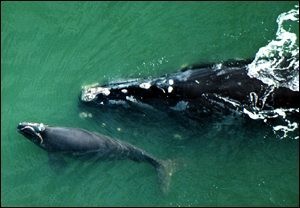|
Toxins threaten whale's survival
By Roger Highfield – Science Editor
The Daily Telegraph
11th January 2003
Marine scientists have discovered that a nerve
toxin may threaten one of the world's most
endangered species, the 300 northern right
whales that remain in the North Atlantic.
The right whale (Eubalaena glacialis) is regularly exposed to the toxins responsible for paralytic shellfish poisoning through feeding on contaminated zooplankton, according to a study in America.
These toxins could affect respiration, feeding and ultimately the reproduction of the whale population, according to a report in the journal Harmful Algae by a team led by Prof Edward Durbin of the University of Rhode Island.
The team describes how North Atlantic right whales, feeding in Grand Manan Basin in the lower Bay of Fundy in late summer, are exposed to the toxins and estimate that ingestion rates are substantial and are similar to the estimated minimum lethal oral dose for humans. Prof Durbin said: "While there is no direct evidence of toxin-related deaths of right whales, we suggest that during their prolonged summer feeding period in this region, they would be experiencing chronic exposure."
Chronic effects of repeated toxin exposure "will be seen in measures of diving capabilities," he said. Impaired diving "would lead to reduced ingestion rates and may be a possible explanation for reduced calving rates in Grand Manan Basin."
Saving two female right whales each year could mean the difference between survival and extinction, says earlier work by Masami Fujiwara and Dr Hal Caswell, of the Woods Hole Oceanographic Institute in Massachusetts.
"We need co-operation among organisations such as federal and state agencies, industries and non-profit groups," said Mr Fujiwara.
|
